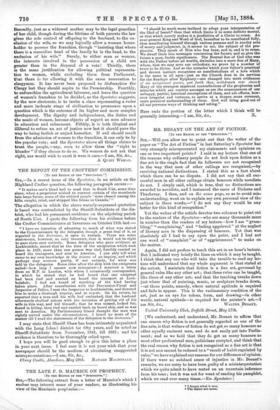MR. BESANT ON THE ART OF FICTION.
[To TRIO EDITOR OP TIER " SPECTATOR."1
SIR,—Will you allow me to point out that the writer of the- paper on "The Art of Fiction" in last Saturday's Spectator has very strangely misrepresented my statements and opinions on one or two important points I) I said in my lecture that one of the reasons why ordinary people do not look upon fiction as a fine art is the single fact that its followers are not recognised in the way that men of other callings are recognised,—by receiving national distinctions. I stated this as a fact about which there can be no dispute. I did not say that all suc- cessful men in all other callings obtain honours while novelists- do not. I simply said, which is true, that no distinctions are awarded to novelists, and I instanced the cases of Dickens and Thackeray. I then, and on the same page, so as to avoid mis- understanding, went on to explain my own personal view of the subject in these words,—" I do not say they would be any better for this kind of recognition."
Yet the writer of the article devotes two columns to point out to the readers of the Spectator—who are many thousands more in number than the readers of my lecture—how I am " grum- bling," "complaining," and "feeling aggrieved" at the neglect of literary men in the dispensing of honours. Yet that wan- absolutely all I had to say upon the point, and I had not one word of " complaint " or of " aggrievement " to make on the matter.
Again, I did not profess to teach this art in an hour's lecture. But I indicated very briefly the lines on which it may be taught. I think that any one who will take the trouble to read my lec- ture will understand that my whole argument is that stated at the outset. I maintain that fiction is a fine art, governed by general rules like any other art ; that these rules can be taught, like those of any other art; and that the teaching breaks down just where that of painting, music, or sculpture breaks down, —at those points, namely, where natural aptitude is required and fails to appear. This is the rudimentary condition of the- art, just as an eye for colour, form, and drawing—in other words, natural aptitude—is required for the painter's art.—I United University Club, Suffolk Street, May 271h.
[We understood, and understand, Mr. Besant to affirm that one reason why fiction is not generally regarded as one of the fine arts, is that writers of fiction do not get so many honours as other equally eminent men, and do not easily get into Parlia- ment; and as we hold that they do get as many honours as most other professional men, politicians excepted, and think that the real reason why fiction is not recognised as a fine art is that it is not and cannot be reduced to a "result of habit regulated by rules," we have explained our reasons for our difference of opinion. If there were no subdued sense of injustice in Mr. Besant's remarks, we are sorry to have been guilty of a misinterpretation which we quite admit to have rested on an uncertain inference from his tone ; but it was not for want of reading his pamphlet, which we read over many times.—En. Spectator.]
* I forget what it was. f The italics are mine.


































 Previous page
Previous page